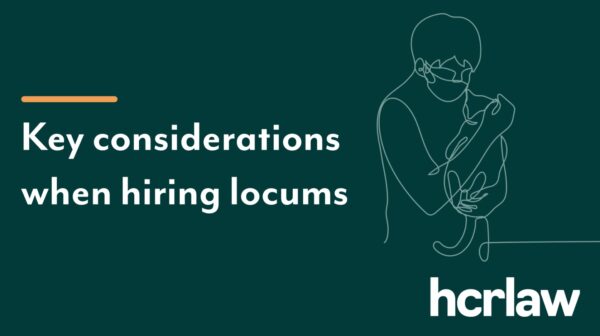

The current pressures on healthcare practices – from dentists to doctors’ surgeries – including the skills shortage, has seen an ever-increasing use of locum arrangements.
What is a locum?
A locum is a person who temporarily fulfils the duties of someone else, often in found in the healthcare industry. Whilst locum arrangements are long-established as commonplace to provide cover for staff holidays and sickness absences, a growing number of practices of all kinds are engaging locums more regularly to posts which are now vacant.
Despite providing a quick and flexible solution, care should always be taken when embarking upon locum arrangements to ensure clear, unambiguous terms and contractual safeguards for the parties, while guarding against an unplanned employment status determination.
Prevention is always better than cure, so it is important to consider these matters ahead of any locum engagement, in order to ensure that it correctly portrays the nature of the proposed engagement; i.e., being that of a contractor, hiring the services of a self-employed locum:
The locum practice agreement consists of two parts:
- (i) A work schedule setting out services to be provided, dates, times and locations– as well as various fees and their payment. This will be the main area of negotiation, so both parties should ensure they are comfortable with the work schedule before signing it and before signing the terms and conditions
- (ii) The terms and conditions – these are valid in conjunction with a completed work schedule which will together form a legal contract. Regular review and update where necessary is important, and always advised of the terms and conditions.
Key provisions
The key provisions at a minimum which are recommended any locum agreement should contain:
Duration – the start and end date of the engagement where possible. This is an important element to a ‘locum’ engagement, helping to mitigate risks that agreements with an indefinite term can pose. Whilst employment contracts are generally ongoing, unless explicitly stated to be fixed-term, contractor agreements expire upon completion of the job – their end date should be clear.
Status – a status clause should be included within the agreement, expressly setting out the working status of the locum as a self-employed consultant, and not an employee, so reflecting the intended legal relationship between the parties. While this does not defeat any later challenge, it does evidence the intention of the parties at the time of entering into the contractual relationship.
Termination – Stating within the agreement how it can be terminated is key. Termination could be for cause and served by either party, by virtue of:
- A breach of terms or non-performance
- For convenience, which can be by mutual agreement of the parties.
The amount of notice required, the obligation(s) of both parties on termination, for example return of equipment by the locum, and how disputes will be resolved at or after termination should be stated.
Death or incapacitation of the locum may also be covered, allowing the contracting party to terminate the agreement with immediate effect, without any further payments other than liability for amounts accrued before this date. This would avoid the contract becoming frustrated and void.
Substitution clause – these clauses permit the locum to provide, at their own expense, a substitute to carry out the services in their place. This is a key provision as caselaw suggests that a wider power to appoint a substitute of the locum’s own choosing – subject to suitability requirements – is a useful indicator for helping to determine self-employed status. This is especially the case where the right is not subject to limits. Therefore, it is helpful to allow appointment of substitutes at any time, not simply when the locum is unable to perform. Along with this, using a substitute demonstrates the arrangement is genuine, and not simply paying lip service to bolster any employment status challenge defence.
NI and tax payment – the agreement should clearly and expressly state that the locum is undertaking the work in a self-employed capacity and agrees to meet their own NICs, income and other taxes arising from the income.
Non-solicitation – this clause is a type of restrictive covenant which seeks to stop the locum from influencing, encouraging or attempting to persuade clients which they have been introduced to during their course of engagement. These clauses also seek to stop the locum from leaving with them and taking their business elsewhere. However, care should taken regarding the use of these types of clauses as they are deemed to be one of the most onerous restrictive covenants, particularly if seeking to enforce on a self-employed person. The scope of a non-solicitation clause should be carefully considered. For example, caution should be taken to ensure:
- They do not seek to enforce for an excessive length of time
- Are not overly restrictive within that specific industry
- Seek to enforce this across too large of a geographical area.
Overly restrictive non-solicitation clauses may be deemed to be unreasonable and as such unenforceable, unless the client practice can genuinely demonstrate that it is to protect a legitimate business interest.
Payment terms – these terms should be specified and outlined explicitly in your locum agreement. This includes invoicing and payment, method of payment, frequency of payment, how travel, mileage and expense will be dealt with. For example, can your locum expense these, or are they personally responsible for these costs? Your agreement will also need to outline exactly how payment will be structured.
Obligations – the agreement should clearly set out both parties’ obligations. This section should be fairly comprehensive. Regarding the locum, factors like the scope of work covered, nature of services to be delivered and whether any licenses need to be obtained could all be considered.
Then, from the practice or healthcare provider’s perspective, the basic facilities which they will be providing to the locum could all be clarified under the agreement, such as information on computer usage, induction information, supplying appropriate equipment, prompt notification of complaints and notice period for cancellation of services could be considered.
Full consideration of locum terms should always be at the forefront of your mind if you or your practice are considering engaging locums. Such agreements can avoid disputes or challenges later in the relationship. Clearly drafted and reviewed terms are essential to solidify the intentions of both parties.










